The Praxis Lyft Carbon Direct Mount cranksets are beautiful works of art that are lightweight (454g) and super stiff. The $450 crankset features hollow carbon arms in 170mm or 175mm lengths with a 3-bolt direct mount ring interface, Wave Tech chainrings (30-36t), and an M30 Thru alloy spindle with an aluminum preload adjuster. Additional or replacement Wave Tech chainrings are $65 – $70 each. It also comes in an HD (Heavy Duty) version with a more robust carbon layup, and a thicker M30 Thru spindle, but it only comes in a 170mm length. The separately available M30 bottom bracket comes in BSA, BB86/BB90/BB92, and BB30/PF30 versions for $45-75 (model dependent.)
For further information refer to praxiscycles.com
Measured Specs (175mm):
- Drive arm – 163 grams
- Non-drive arm with spindle – 238 grams
- 30t chainring – 57 grams
- Pedal boot covers – 17 grams
- Bottom bracket – 91 grams
Features
The Lyft crankset utilizes hollow carbon crank arms and a 30mm diameter alloy spindle that is bonded to the non-drive side. It comes in 170mm and 175mm crank arm lengths with a generic SRAM 3-bolt direct mount chainring interface. Their direct mount Wave Tech chainrings have a tooth pattern/profile that swings right to left to alternate the lateral force to each chain link for maximized chain retention and debris evacuation. The Wave Tech rings are manufactured from 7075-T6 aluminum with hard anodization and come in 30, 32, 34, and 36t sizes and in Boost (52mm) and Non-Boost (49mm) chainlines. Their M30 Thru Spindle is designed to work with their M30 Thru Bottom Bracket for an optimized coupling and it comes in BSA, BB86/BB90/BB92, and BB30/PF30 options. The crankset has a 172mm Q-Factor, weighs around 450g and works with 10, 11, and 12-speed chains.
Tested kit contents:
- Non-Drive side carbon crank arm with bonded 30mm spindle
- Drive side carbon crank arm with direct mount bolts
- Spindle preload ring
- Wave Tech chainring (Boost 30t)
- M30 Thru bottom bracket (BSA)
- Two crank arm boot protectors
- Two 2mm and two 1mm dust covers
- Bottom bracket tool
- Crank arm protection tape (not shown)
Installation
My Ibis RipMo has a 73mm wide English threaded bottom bracket setup, so I choose their M30 BSA version for the proper compatibility. Their design doesn’t utilize any spacers with the BB which simplifies things, so using the provided M30 bottom bracket tool I directly installed the drive and non-drive side cups to their correct torque specification of 40Nm. Next, I slid on the non-drive side arm/spindle assembly with the preload ring snugged up against the arm, meaning there was no preload set as yet. With the direct mount Wave chainring installed on the drive side arm, I added a 2mm dust cover and attached the arm to the splines of the spindle and torqued it down with an 8mm hex socket to 50Nm. The last step is to twist the preload ring by hand to remove any play in the system and then tighten the lock bolt down with a 2.5mm hex key.
Impressions
The preload bearing adjustment system is similar to what Race Face utilizes, though instead of a gimmicky plastic ring, it uses a more robust and precise aluminum collar. The preload collar rotates inboard, and outboard on the spindle on relatively fine threads, so it can be prone to binding slightly when grit and grime gunk things up. The collar/ring functions quite nicely to get the preload set properly and remove any play and slop in the spindle, bottom bracket, and arm interface. After the collar is adjusted correctly to hand tightness, it can be locked down with a simple pinch bolt. It rarely ever required a readjustment to get the proper tightness to the drivetrain system, and it stayed smooth and snug throughout many months of heavy use.
The M30 Thru alloy spindle is thick and beefy, and the 30mm diameter offers additional strength and stiffness. The M30 Thru bottom bracket features oversized bearings to fit the 30mm axle, and it required the included proprietary M30 bottom bracket tool to install the cups. The crank arms are much thicker and chubbier than other comparable manufacturers carbon crank arms so you might have clearance issues with some frames chainstays, though I didn’t have any problems on my RipMo, even with the protective boot installed.
Since the drive aside arm doesn’t have an attached spindle, it’s easy to remove the arm to switch out the chainring. It uses the SRAM 3-bolt direct mount interface system, which provides a solid connection and simple/quick removal and installation.
Praxis has licensed MRP’s Wave design and technology for their chainrings. Instead of the more typical 1x narrow/wide designs that rely on friction, MRP’s Wave Tech provides active and positive alternating lateral engagement of every chain link with a chainring tooth. The tooth pattern and profile swings right to the left (aka the Wave), grasping the interior of the chain for optimal retention even in adverse conditions, yet still offering room for mud, debris, and grit to escape. For proper chain interfacing, there is a small graphic on the Wave Tech chainring to get the correct orientation of the chain on the teeth.
After months of heavy riding, the Wave Tech chainring was smooth and quiet and worked like a charm, and I only had rare retention issues in some heinously wet and sandy conditions. Eventually, like all aluminum chainrings, the alloy teeth began to wear, but it was to a greater degree and much more prematurely than other brands I have used. When that wear happened, I noticed an increase in noise and grumbling coming from the drivetrain, especially under heavy torque use and when grinding hard on steep climbs. If I lubed the chain, the noise would greatly diminish and temporarily be just subtle background clatter, but after some mileage, the problem would crop back up. I would say that the Wave Technology chainring works quite well when new, but seems to degrade within a somewhat shorter timeframe.
I ride in an area that has a lot of fine sand that gets sucked into everything and causes quick wear and tear on many components, and it’s especially exacerbated during periods of rain and snow. Even though their bottom bracket doesn’t have an internal sleeve between the cups and only utilizes a small dust cover on the drive side, grit and grime haven’t overly infiltrated into the bearings, and even after almost a year of heavy use, things still spin smoothly. I tend to go through most bottom brackets quickly, but their M30 Thru Bottom Bracket has been long-lived, creak-free, and smooth running throughout the entire test period.
Bottom Line
The Praxis Works Lyft carbon crankset is stunning looking, stiff, robust, light, and offers superb power transfer to the drivetrain system. I never felt any trace of flex from the thick hollow carbon arms and oversize 30mm spindle, even when flying along on rugged gnarly terrain and when hammering and torquing hard on the pedals. The carbon hasn’t delaminated or shown any excessive wear from rocks impacts, and I have only a couple of tiny chips, which is a testament to their toughness and durability, especially considering the abusive places I frequent. They came with clear protection tape and boots for the arms, which significantly alleviated wear and tear in areas that get concentrated attacks. The drive side crank arm easily decouples from the axle providing quick chainring swap outs, and the oversized M30 Thru bottom bracket offered excellent long-life and smooth rolling, even in adverse conditions.
The only gripe I have is the premature wearing of the Wave Tech chainrings, which can create extraneous drivetrain noise when they get old.
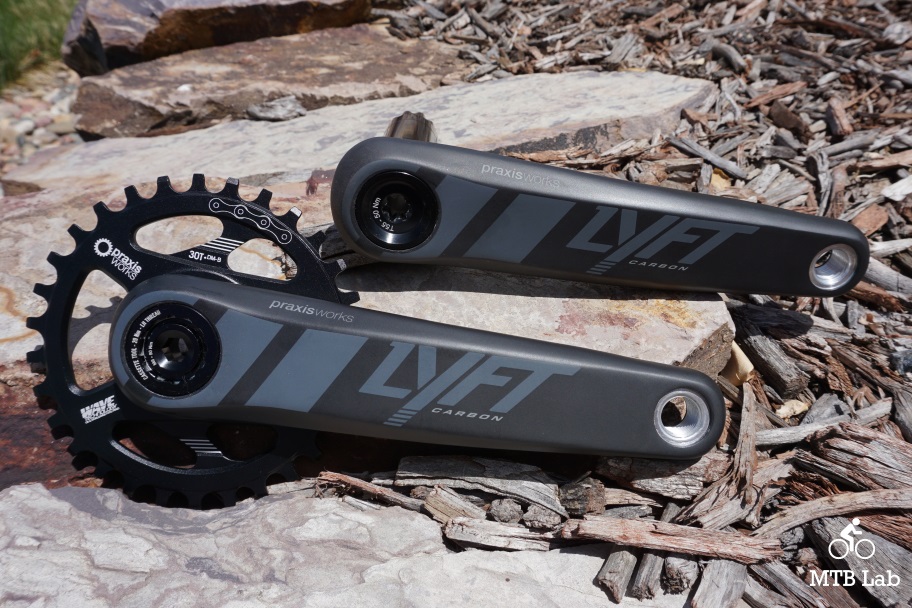
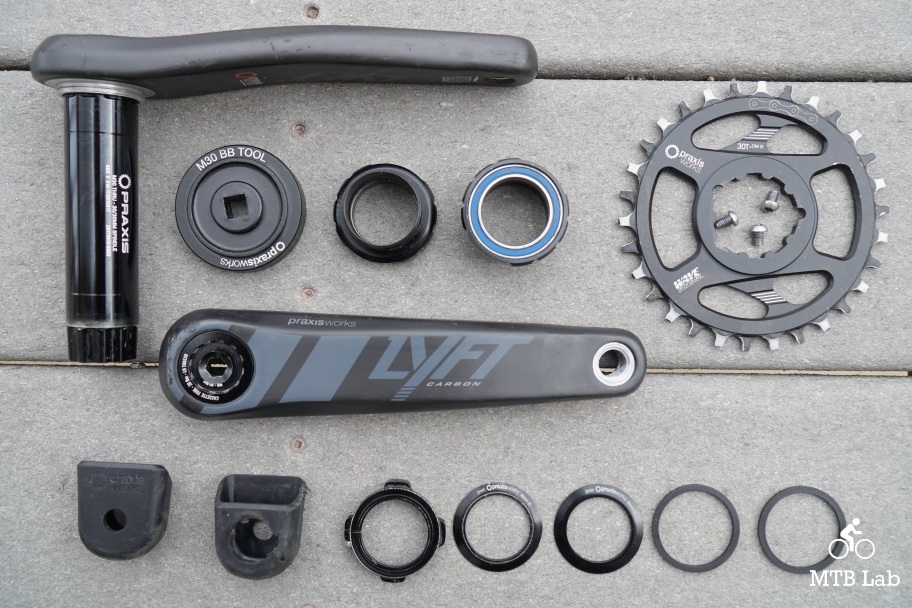
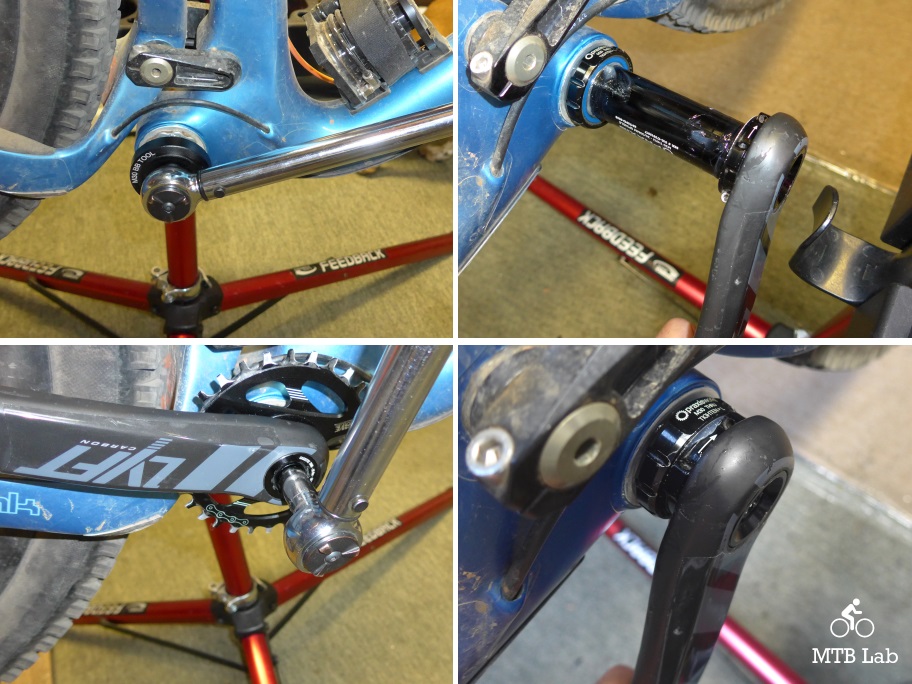
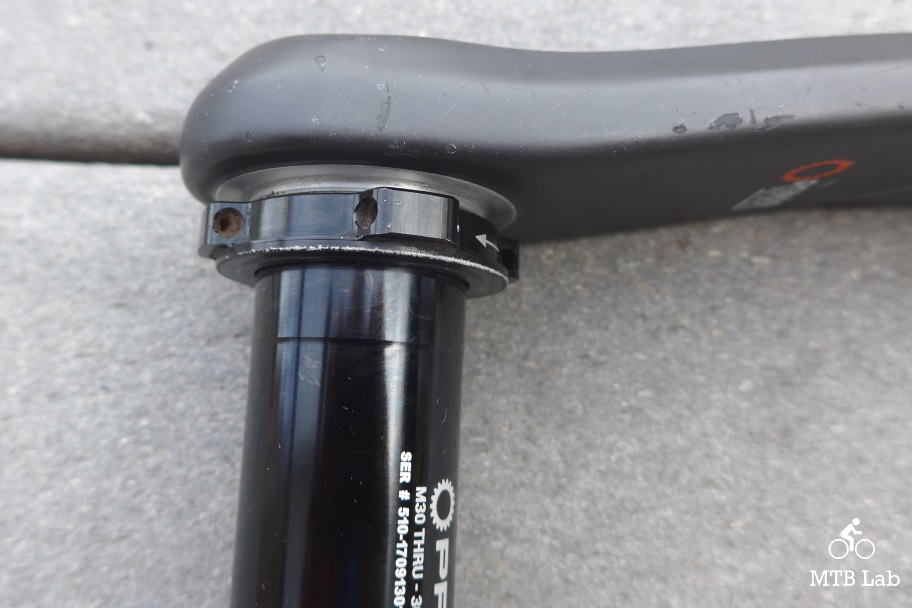
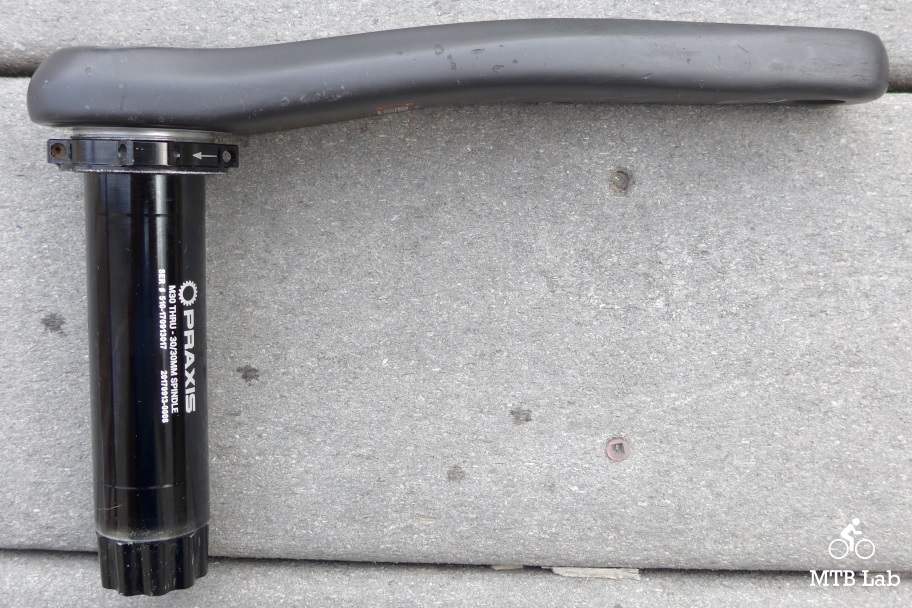
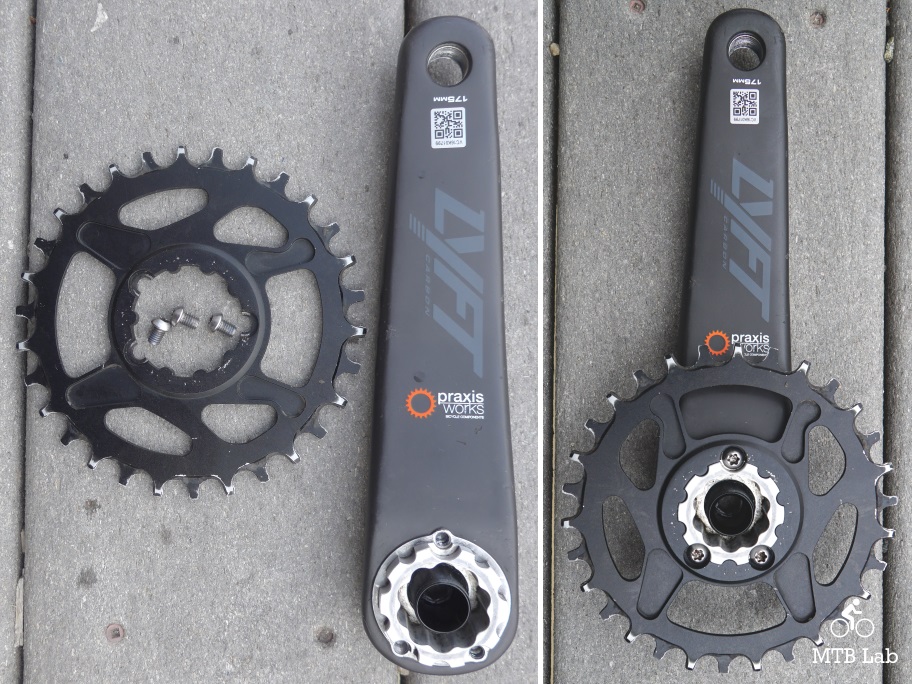
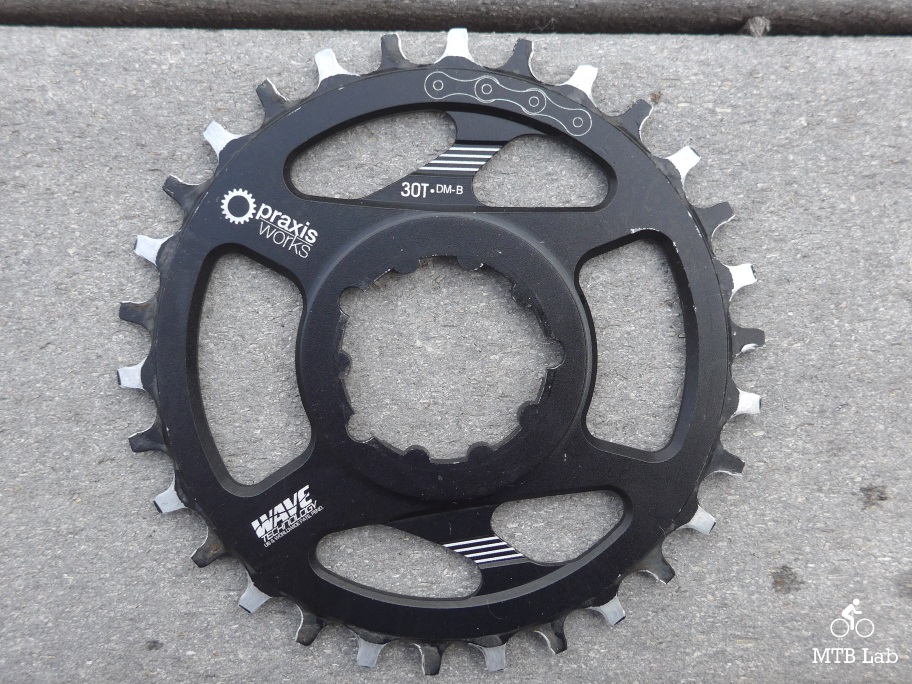
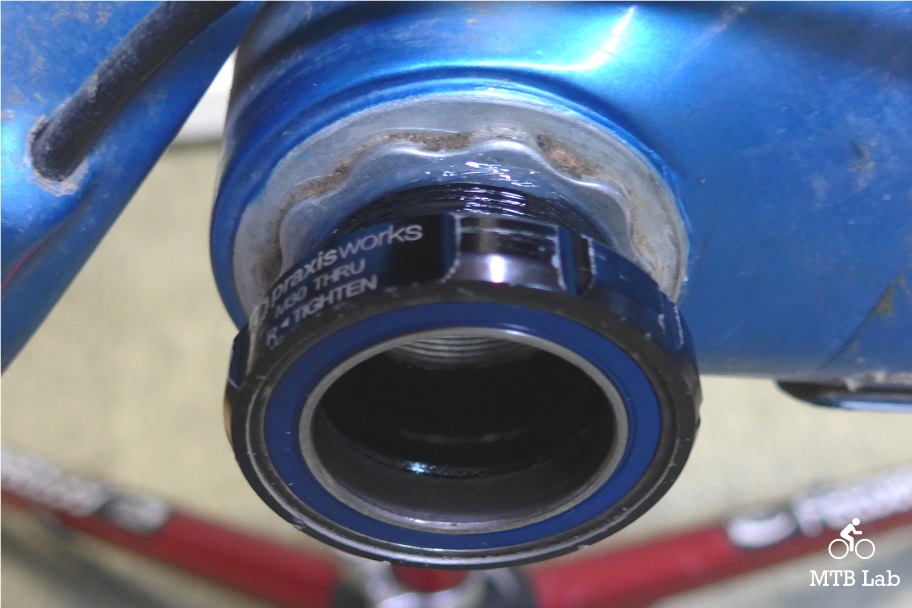
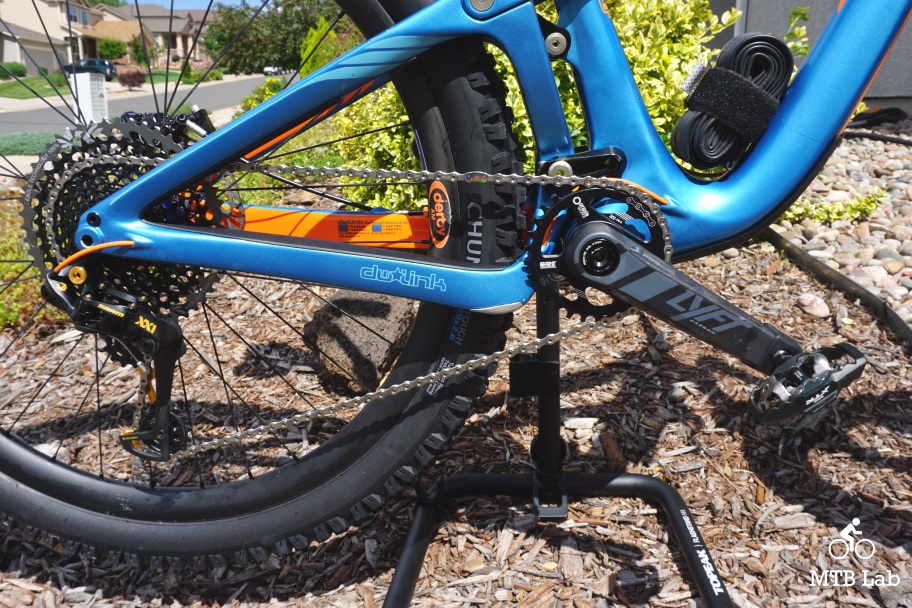





{ 2 comments… read them below or add one }
Hi, regarding the chain ring, as it wears quickly could a sram chainring be installed instead of the praxis brand?
Kos,
Yes. I added a SRAM Eagle steel chainring on the Praxis cranks. Works perfect, and tough as nails!
Brian